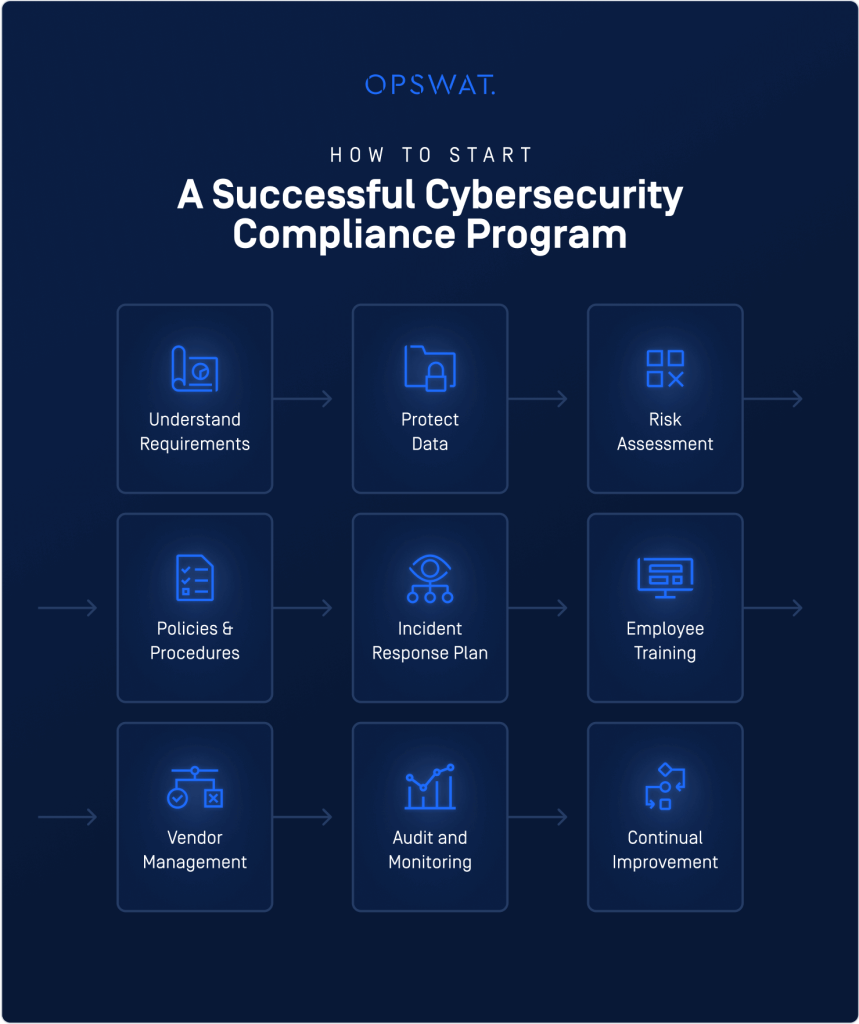In today’s digital landscape, cybersecurity compliance training has become an essential component for organizations striving to safeguard their data and infrastructure. With 70 percent of UK Chief Information Security Officers (CISOs) feeling pressured to conceal security incidents, training programs are crucial in mitigating such risks and promoting ethical disclosure practices. The rising number of cyber breaches reported by over 600,000 UK businesses underscores the urgency for comprehensive cybersecurity risk management strategies. Furthermore, organizations face financial ramifications from breaches, with costs averaging £3,550 for companies and far exceeding that for charities. By prioritizing cybersecurity compliance training, businesses can not only fulfill legal obligations but also bolster their defenses against the evolving threat landscape.
Cybersecurity compliance education is increasingly vital for organizations aiming to protect their digital assets. As the pressure on Chief Information Security Officers (CISOs) mounts to maintain a concealed narrative around data breaches, the focus shifts towards fostering a culture of transparency and ethical accountability. With a staggering number of UK organizations experiencing cyber incidents, the implementation of robust data protection frameworks becomes paramount. Moreover, understanding data breach reporting obligations and developing comprehensive cybersecurity risk management protocols can significantly mitigate these challenges. By investing in compliance training, businesses position themselves to enhance resilience while nurturing trust among stakeholders.
The Burden of CISO Cybersecurity Pressure in the UK
Recent findings highlight a disturbing trend among Chief Information Security Officers (CISOs) in the UK, where 70 percent report feeling pressured to conceal security incidents, including breaches and cyberattacks. This pressure is often driven by a desire to protect the corporate reputation, overshadowing the imperative to comply with cybersecurity regulations. As UK businesses endure increasing cyber threats, the ramifications of this concealment can be dire, including hefty regulatory penalties and a significant erosion of customer trust, further complicating cybersecurity risk management efforts.
Moreover, the current landscape of cybersecurity in the UK reveals that 612,000 businesses and 61,000 charities faced cyber breaches or attacks last year alone. The average costs incurred from severe attacks soar to £3,550 for businesses and £8,690 for charities, illuminating the direct financial repercussions of breaches. CISOs must navigate a complex environment that pits the need for transparency against pressure to avoid public scrutiny. This dynamic not only threatens corporate survival but also indicates a systemic issue within corporate cultures regarding cybersecurity compliance.
The Role of Cybersecurity Compliance Training
Cybersecurity compliance training has emerged as an essential element for mitigating risks associated with data breaches and cyberattacks. As Vivik Dodd from Skillcast suggests, providing training that is synonymous with ethical and operational understanding is crucial for boards and CISOs. Such training helps executives recognize their legal responsibilities and empowers them to prioritize transparency over reputation management. In essence, compliance training should be viewed not merely as a tick box exercise but as an integral practice that reinforces a culture of accountability within an organization.
To effectively combat the growing pressures that lead to concealment, organizations must incorporate comprehensive compliance training programs that focus on ethical disclosure practices and risk management strategies. Mandatory training sessions are vital, where senior executives learn the implications of not reporting cyber incidents adequately. By fostering an environment that values transparency as a corporate principle, organizations can cultivate an empowered workforce capable of acting judiciously under pressure, ultimately contributing to a more robust cybersecurity posture.
The Impact of Concealment on Corporate Reputation
Concealing cyber incidents can have catastrophic effects on a business’s reputation. When incidents are kept secret, not only do organizations evade their compliance obligations, but they also risk exacerbating trust issues with customers and partners. Over time, this concealment leads to a negative perception as stakeholders become increasingly aware of a company’s unwillingness to embrace transparency. Such a perception can deter potential clients and damage existing relationships, highlighting the critical need for ethical disclosure practices in the face of cybersecurity threats.
Moreover, as evidenced by recent statistics showing prevalent phishing attempts, businesses must recognize that employees can inadvertently contribute to reputational damage through ignorance or insufficient training. Boards and executives need to foster a culture where staff feel informed and supported in recognizing and reporting incidents, rather than incentivized to hide them for fear of repercussions. By normalizing open communication about breaches and implementing proactive management strategies, companies can not only safeguard their reputation but also foster a culture of trust that resonates with their stakeholders.
Addressing Cybersecurity Risks through Employee Training
To effectively mitigate cybersecurity risks, organizations must cultivate a well-informed workforce adept at identifying threats. Training programs that focus on recognizing phishing attempts and understanding cyber hygiene can empower employees to take proactive steps against potential breaches. According to Skillcast’s survey, while 85 percent of finance professionals feel confident about spotting scams, a significant percentage still succumb to clicking suspicious links. Hence, comprehensive training must combine theoretical understanding with practical simulations that mimic real-world scenarios.
Simulations and role-playing can play a critical role in building resilience against cyber threats. By participating in these exercises, employees can practice appropriate responses to security incidents, reinforcing their ability to act swiftly and transparently under pressure. Incorporating real-time feedback and situational analysis within these training frameworks will ensure that staff not only learn the standard procedures for reporting incidents but also grasp the ethical implications of their actions. Organizations that prioritize continuous learning and adaptability in their cybersecurity approach are best positioned to counteract the evolving landscape of cyber threats.
Legal Obligations and Ethical Considerations in Cybersecurity
Navigating the legal landscape of cybersecurity is imperative for companies concerned about compliance and risk management. As regulators increasingly demand accountability, organizations must be aware of their obligations surrounding data breach reporting and the implications of non-compliance. Legal frameworks often dictate clear guidelines on when and how breaches must be reported, so training not only must highlight these legal obligations but also reinforce ethical considerations related to transparency and accountability.
Furthermore, the ethical responsibility to disclose breaches fosters a culture of trust among stakeholders. When companies prioritize ethical disclosure practices, they embrace a stance that not only adheres to regulatory demands but also enhances their overall reputation in the market. Educating CISOs and executive teams on the fine balance between legal requirements and ethical considerations is essential in shaping a resilient cybersecurity framework that values compliance over concealment.
Building Resilience through Cultural Change in Cybersecurity
Creating a resilient cybersecurity environment requires a cultural shift within organizations—a transformation that promotes openness and proactive incident response. Leadership must advocate for transparency, ensuring that employees at all levels recognize the significance of reporting breaches without fear of retribution. Such a shift can significantly improve an organization’s cybersecurity posture by fostering accountability and trust among team members.
Additionally, cultural change must be reinforced through ongoing training and development programs that emphasize the importance of cybersecurity compliance. As organizations aim to eliminate pressures that drive concealment, it becomes vital to integrate core values that appreciate the nuances of ethical disclosure. By establishing a culture supportive of transparent communications regarding security incidents, companies can not only mitigate risks but also enhance their operational effectiveness in the face of evolving cyber threats.
The Future of Cybersecurity Compliance in Business
As cyber threats continue to evolve, the future of cybersecurity compliance will hinge on organizations’ abilities to adapt and prioritize transparency. Businesses that embrace rigorous training and compliance protocols stand a better chance of not only mitigating potential breaches but also of enhancing their trustworthiness. Stakeholders are increasingly aware of cybersecurity vulnerabilities, and as a result, companies that commit to transparency and ethical disclosure practices are likely to thrive.
In conclusion, the imperative for a cultural shift toward transparency within the framework of cybersecurity compliance training cannot be overstated. Organizations must recognize the multifaceted nature of cybersecurity risks and equip their leaders with the knowledge and skills necessary to navigate this complex environment. Investing in ethical disclosure practices and fostering a resilient corporate ethos will be critical in shaping the future of cybersecurity in the business landscape.
Empowering Employees to Combat Cyber Threats Effectively
Empowering employees within organizations to actively combat cyber threats is crucial for maintaining a secure operational environment. Providing multifaceted training that encompasses practical strategies for recognizing and responding to cyber threats equips employees with the tools necessary to act decisively when faced with potential incidents. When employees feel confident in their cybersecurity knowledge, they become a formidable line of defense against external attacks.
Moreover, organizations can further enhance employee empowerment by establishing clear lines of communication that encourage reporting any suspicious behavior or incidents without hesitance. Training programs that instill a sense of ownership over cybersecurity responsibilities can motivate employees to take proactive measures, ultimately contributing to a culture of collective vigilance. Keeping employees informed on emerging threats, such as recent phishing techniques, helps in building a robust workforce that is continually prepared to face the evolving challenges of the cybersecurity landscape.
The Necessity of Ethical Disclosure in Cybersecurity Frameworks
Ethical disclosure is an essential component of modern cybersecurity frameworks. It addresses the growing concern among stakeholders regarding transparency in handling cyber incidents. When organizations prioritize ethical practices regarding disclosure, they not only comply with legal mandates but also cultivate an organizational culture rooted in trust and integrity. This creates a favorable environment where employees feel secure in reporting breaches and incidents without fear of backlash.
Moreover, the necessity for ethical disclosure is underscored by the reality that concealing breaches often exacerbates the fallout when incidents eventually come to light. Organizations must embrace the practice of ethical reporting as part of their commitment to cybersecurity compliance. By viewing disclosure not as a regulatory burden, but rather as an opportunity for engagement and improvement, businesses can transform their cybersecurity approaches to be more resilient while maintaining stakeholder trust.
Frequently Asked Questions
What is the importance of cybersecurity compliance training for UK businesses facing breaches?
Cybersecurity compliance training is crucial for UK businesses, especially in the context of increasing cyber breaches. Proper training equips employees with the knowledge and skills to recognize and respond to cybersecurity threats, ensuring that organizations meet legal obligations and ethical standards. This proactive approach helps prevent incidents and fosters a culture of transparency, which is essential for maintaining trust in the face of potential data breach reporting.
How do CISOs handle pressure regarding cybersecurity compliance and incident disclosure?
CISOs often face significant pressure to conceal security incidents to protect corporate reputation. This pressure can undermine cybersecurity compliance training efforts, making it imperative for CISOs to prioritize transparency and ethical disclosure practices. Training programs that reinforce the legal and ethical responsibilities of disclosing incidents can empower CISOs to navigate these challenges while maintaining organizational integrity.
What are the risks of inadequate cybersecurity compliance training?
Inadequate cybersecurity compliance training can lead to severe risks for businesses, including increased vulnerability to attacks and regulatory penalties. When staff lack proper training, they may not recognize security threats, contributing to cybersecurity risk management failures. Moreover, without a culture of transparency fostered through effective training, organizations risk hidden breaches that could escalate into significant data breaches and loss of trust.
What role does ethical disclosure play in cybersecurity compliance training?
Ethical disclosure is a key component of cybersecurity compliance training, emphasizing the importance of reporting incidents rather than concealing them. Training programs must incorporate ethical frameworks to guide CISOs and organizations in decision-making processes. This focus on integrity not only helps in regulatory compliance but also builds trust with stakeholders and enhances the overall cybersecurity culture within the organization.
How can UK businesses improve their cybersecurity compliance training programs?
UK businesses can enhance their cybersecurity compliance training by implementing mandatory training for leaders and boards, focusing on their disclosure responsibilities. Incorporating practical exercises and simulations can prepare teams for real-world pressure, fostering a resilient culture. Additionally, eliminating internal pressures to conceal information and prioritizing transparency as a corporate value are essential to effective compliance training.
What should organizations do to foster a culture of transparency in cybersecurity?
Organizations should emphasize the importance of transparency in their cybersecurity policies and practices. This can be achieved through comprehensive cybersecurity compliance training that addresses the ethical and legal implications of incident disclosure. By creating an environment that values open communication and places no undue pressure on CISOs and staff, organizations can significantly improve their resilience against cyber threats.
| Key Point | Details |
|---|---|
| Pressure on CISOs | 70% of UK CISOs feel pressured to hide security incidents. |
| Consequences of Concealment | Hiding breaches can lead to regulatory penalties and loss of trust. |
| Cyberattack Statistics | Over 612,000 UK businesses and 61,000 charities reported breaches in the last year. |
| Cost of Breaches | The average cost for a disruptive breach was £3,550 for businesses and £8,690 for charities. |
| Importance of Transparency | Lack of transparency can undermine cybersecurity efforts and lead to systemic weaknesses. |
| Recommendations | Businesses should implement mandatory training and foster a culture of transparency. |
Summary
Cybersecurity compliance training is paramount in today’s digital landscape where businesses face considerable risks from cyberattacks. As highlighted by recent findings, many Chief Information Security Officers (CISOs) are under immense pressure to conceal breaches, which poses significant threats to compliance and trust within organizations. Establishing robust training programs that emphasize transparency and proactive measures for executives and boards is critical. By prioritizing cybersecurity compliance training, organizations can empower their staff to act responsibly under pressure and view disclosure as an opportunity for building trust rather than a regulatory obligation.




